I must confess that I feel a certain attachment to reciprocal links (otherwise known as link exchanges). They were the first “SEO hack” that I ever applied in my career.
Let me share that story real quick:
Ten years ago, I was an EDM DJ with a growing interest in SEO. I knew some SEO theory, but I had yet to put it into practice. To solve this, I launched my own website where I published a weekly selection of newly-released electronic dance music. It became a testing ground for my SEO abilities.
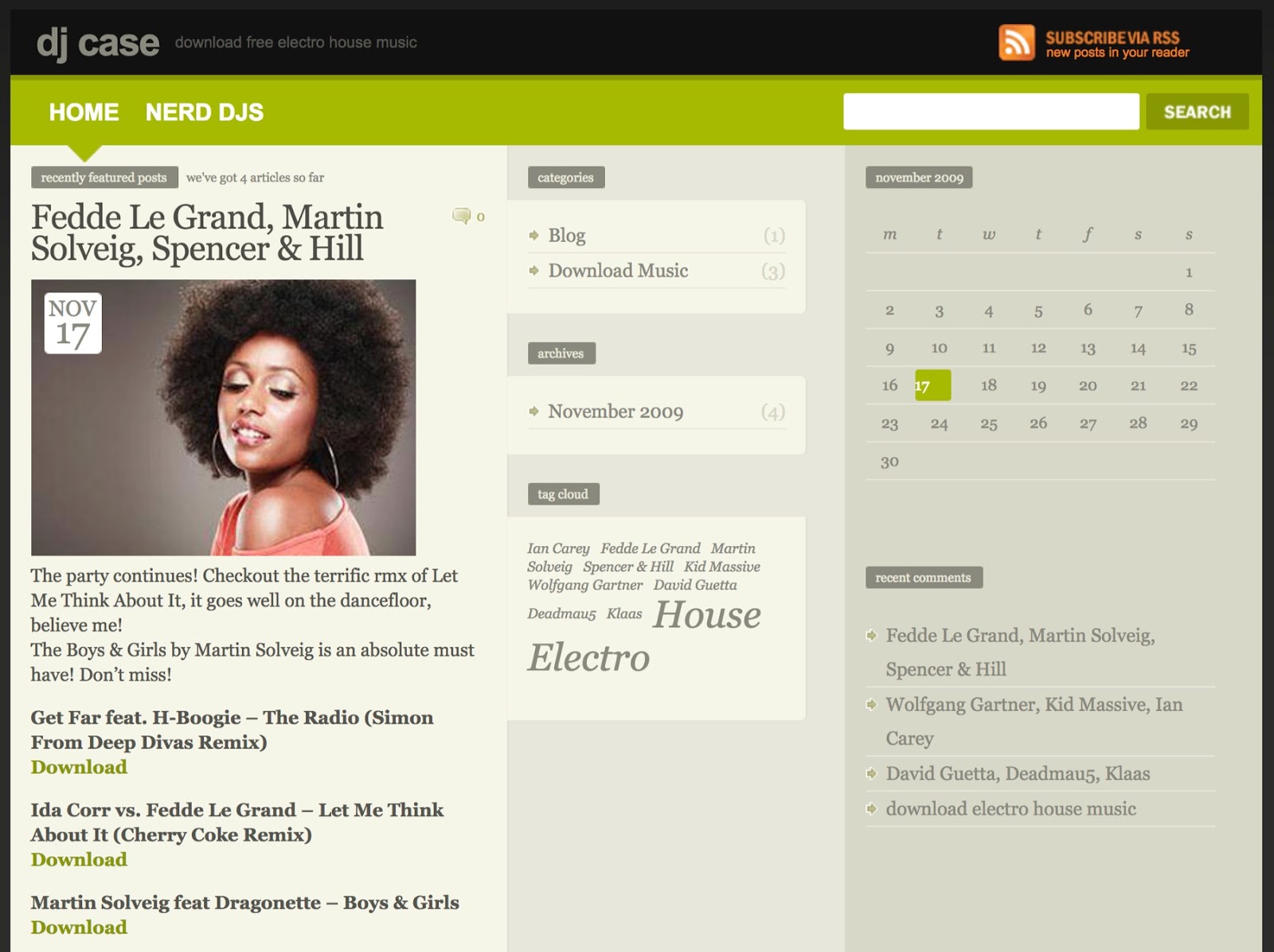
The first website I ever launched was as embarrassing as it gets. No surprise it’s no longer live.
Long story short, I quickly realized that if I wanted Google to send relevant traffic my way, then I needed links from other websites. That’s when I learned about reciprocal links.
I found a few dozen similar blogs to mine and offered to exchange sitewide links with them. They agreed. The problem? Reciprocal links were against Google’s Webmaster Guidelines and still are.
But it didn’t take me long to figure out a workaround for this problem…
Instead of putting my outbound sidebar links directly on my site, I put them in an embedded iframe. The result? My blogger friends could see that I was linking to them but Google was none the wiser.
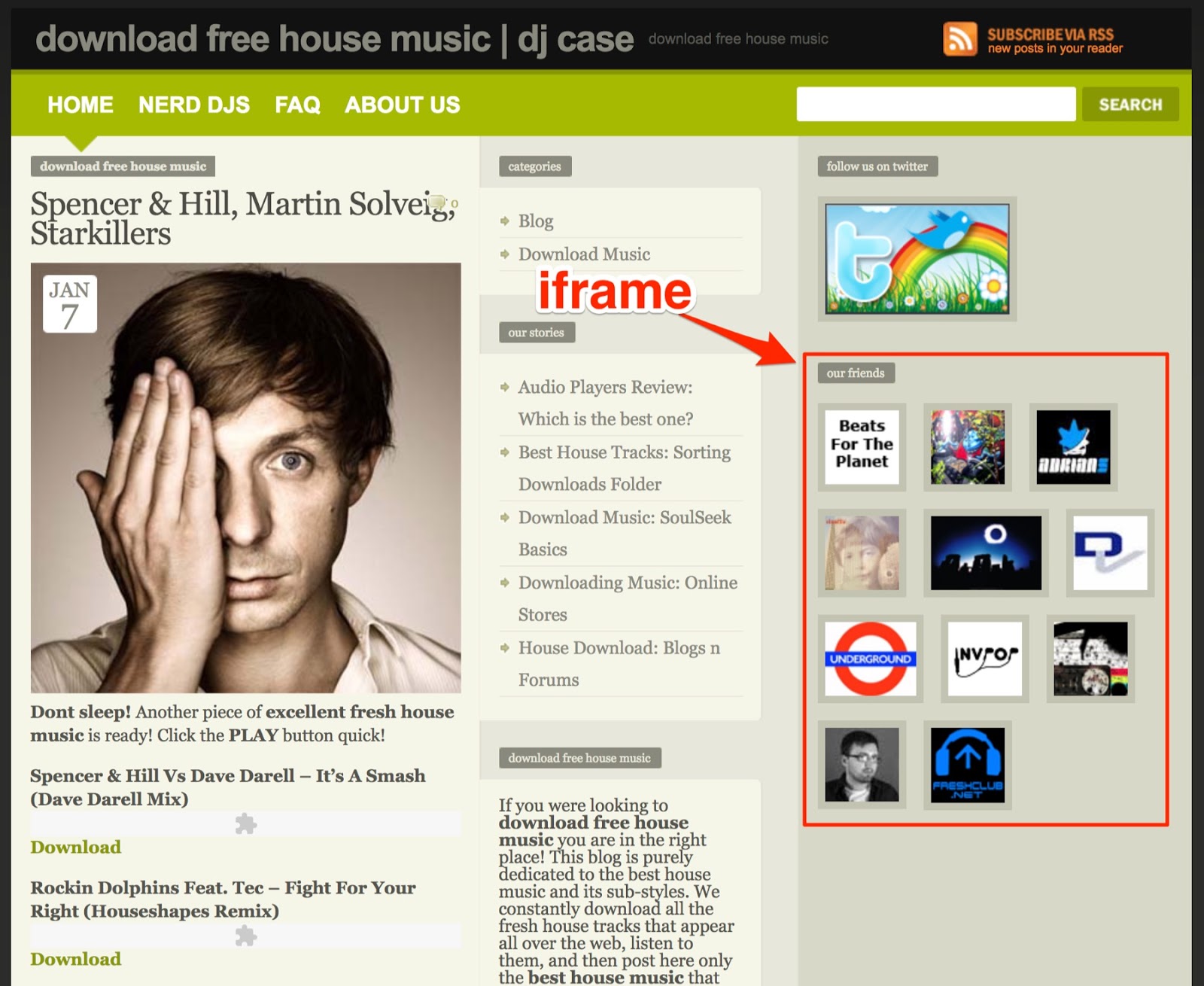
Please don’t judge me for this trick. I was an SEO newbie and my moral compass wasn’t well-tuned.
Needless to say, I thought I was pretty smart. That was until my blog proceeded to get no organic search traffic for over a year.
For transparency: I can’t be 100% sure that my lack of organic traffic was the result of a penalty for attempting to trick Google. There’s a chance that my blog just got sandboxed. Still, that was the first and last time I tried to build backlinks via link exchanges. I haven’t done it since.
Now, enough about me. Let’s get to the study you came here for.
How common are reciprocal links on the web?
The best way to know if reciprocal links do more harm than good is with an experiment:
- Create a bunch of websites
- Build similar backlink profiles for them all
- Wait until they start ranking in Google for some keywords
- Build a particular number of reciprocal links to some of those websites. Leave a few of them intact as your control group. Observe what happens next.
I don’t think I’ve seen anyone carry out an experiment of this nature before. Hardly surprising, as doing so would be quite a labor and resource intensive process.
Further, here at Ahrefs, we don’t run such experiments—we only study data we already have at our disposal.
So that’s what we did. We:
- Took 140k websites with 10k+ visits/month from Google (estimated by Ahrefs)
- Checked for overlap between the sites to which they link and the sites that link to them
- Plotted the results on a graph to visualize how common reciprocal links are
Our thinking was simple: By studying how common reciprocal links are among websites getting consistent traffic from Google, we could get some clue as to the toxicity (or not) of such links.
Here are the results:
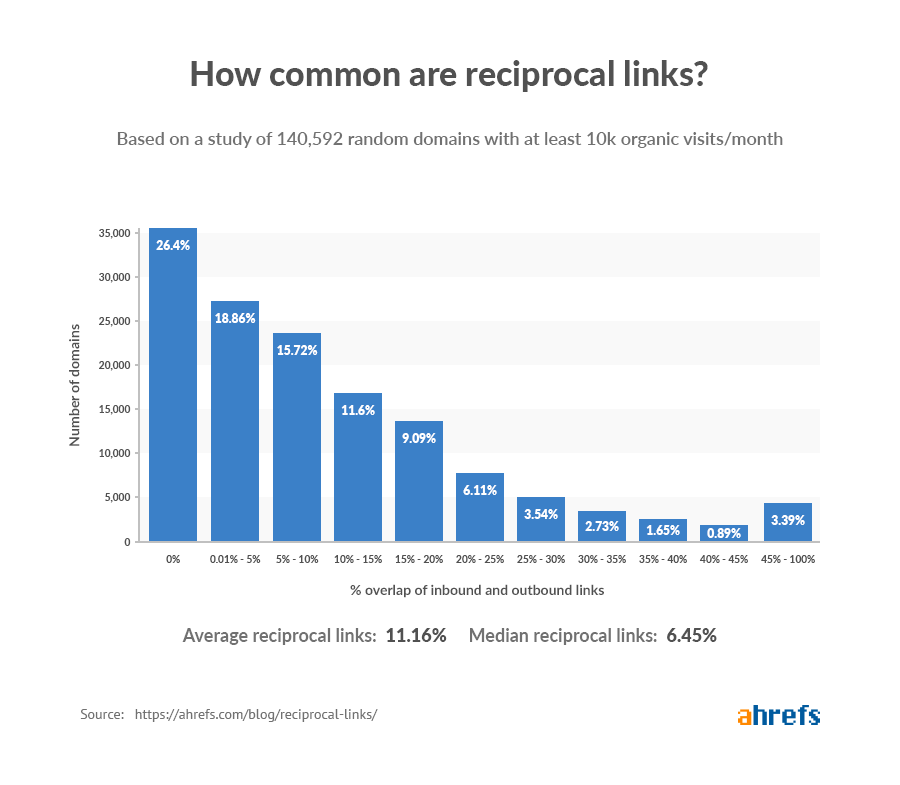
26.4% of the 140,592 domains in our sample have no reciprocal links. 73.6% do.
Furthermore, 27.4% of the sites we studied—almost ⅓—have at least a 15% overlap between the sites to which they link out and the sites that link to them.
Are you curious as to what these stats look like for the Ahrefs blog?
We did the math and found that 19.25% of the domains we link to also link to us.

It would seem then that reciprocal links are a common byproduct of the web, so you probably shouldn’t be afraid to link to sites already linking to you. The same applies when asking for links from sites to which you already link.
But here’s the thing: This study doesn’t actually prove that reciprocal linking is 100% safe to do. That’s because it suffers from suvivorship bias.
In plain English, this means that because we only studied domains with search traffic, any penalized websites were likely excluded from the start.
So right now, the only thing we can say with certainty is this:
It’s possible for some sites with relatively high amounts of reciprocal links to perform reasonably well in Google.
How common are reciprocal links in Google’s top 10 search results?
The previous study confirmed our assumption that having a certain percentage of reciprocal links is perfectly natural and won’t necessarily lead to Google penalizing your website.
But how “powerful” are reciprocal links?
This is an important question. It’s easier to convince friends—to whom you may have already linked in the past—to link to you as opposed to complete strangers. For that reason, it would make sense for Google to value links from friends’ websites less than those from others, right?
The best way to prove that is with an experiment:
- Create a bunch of web pages with similar backlink profiles
- Build reciprocal links to some of those pages. See what happens next.
If you ever perform such an experiment, let us know.
For now, we decided to work with the data we already have and study the commonality of reciprocal links among the top 10 ranking pages in Google. We:
- Took a sample of ~10k non-branded search queries (with Keyword Difficulty scores between 40 and 60)
- Pulled top 10 ranking pages in Google for each of them
- Looked for overlap between the sites linking to those pages (referring domains) and the sites to which the residing website links out
- Plotted the results on a pie-chart
Important: Once again, we only looked at “dofollow” links.
Here are the results:
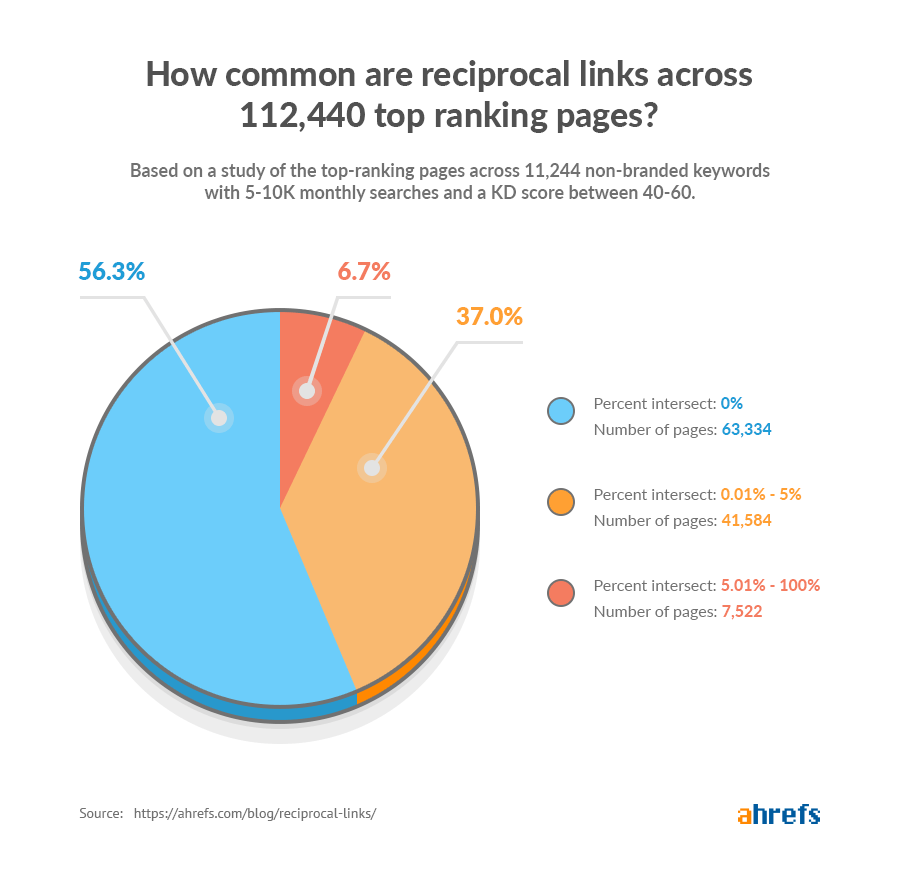
43.7%—almost half—of the 112,440 top-ranking pages we studied have some reciprocal links.
This once again seems to indicate that reciprocal links are a natural byproduct of the web. 4-5 out of every top 10 organic Google rankings have some reciprocal links, on average.
We were also curious to see some data for our own site. So here’s what we did:
- Took the top 10 pages on ahrefs.com (by search traffic) from the Top Pages report in Site Explorer
- Found the “dofollow” referring domains to each page
- Looked at how many of those domains we link out to from anywhere on ahrefs.com
- Calculated the percentage overlap between them
NOTE. We calculated percentage overlap by dividing the number of overlapping domains by the total number of “dofollow” referring domains to each page.
Here’s what we found:
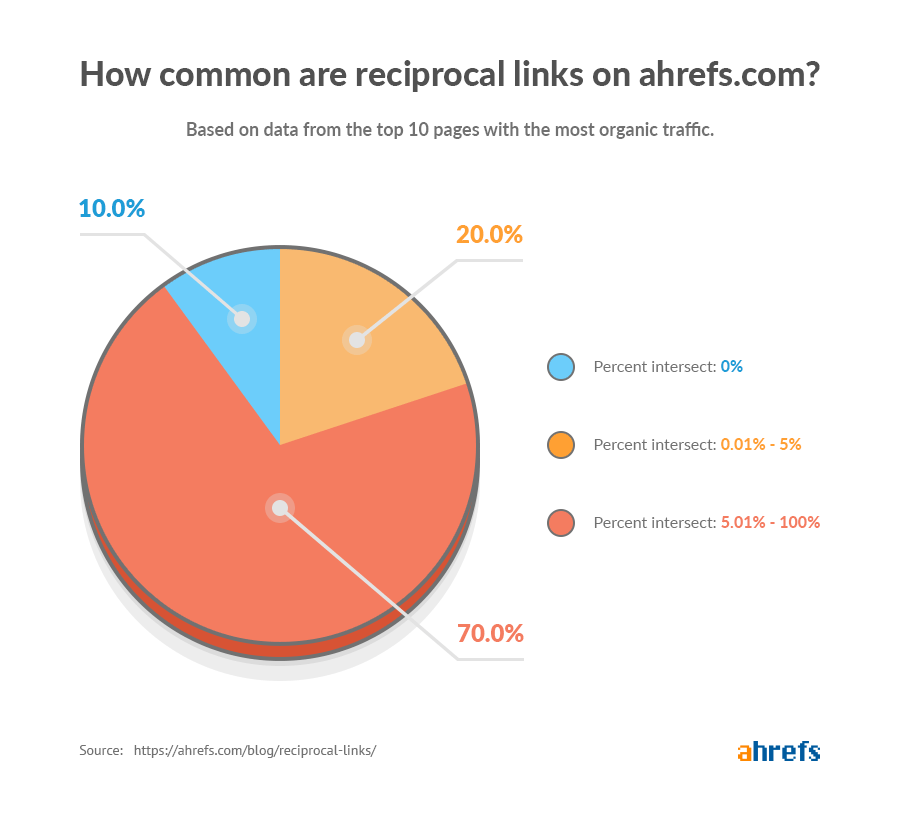
One page had no overlap, two pages had 0.01%-5% overlap, and seven pages had 5.01-100% overlap.

However, note that studying the top-ranking pages says nothing about cause and effect (correlation ≠ causation). It may well be the case that these pages got to the top of Google thanks to some early reciprocal links from friends. Then, as a result of getting organic traffic and exposure, they went on to pick up more links from other websites.
On the other hand, these pages could be ranking in spite of their reciprocal links. There’s no way of knowing for sure from the data we have.
Should you be building reciprocal links?
The answer largely depends on your understanding of “building reciprocal links.”
Exchanging sitewide links with other sites in your industry is unlikely to work. So confident am I (Yoda!?) that this is true, we didn’t even perform any relevant research to attempt to prove otherwise. Heck, I don’t even remember the last time I saw a half-decent website with a sitewide outgoing link, do you?
(Don’t want to take my word for it? The fact that link exchanges violate Google’s Webmaster Guidelines should be proof enough that this is a bad idea.)
But when it comes to building relationships in your niche by generously linking out to relevant resources—and subsequently ending up on the radars of site owners as a result of doing so, which may indirectly lead to links from them further down the line—well, that’s a good strategy in my eyes.
Most content publishers are in fact already doing that, whether consciously or not.
Finally, if you’re actively sending “will you link to me if I link to you?” outreach emails, then please stop. We get these every once in a while at Ahrefs and we hate dislike them. We’re betting other website owners do too, as they’re quite disrespectful.
Read these two guides for more outreach advice. Or check out this video:





